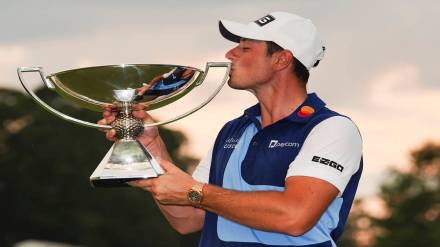The most appropriate adjective, and there have been quite a few, to describe Viktor Hovland’s run at the end of the season-ending FedEx Cup Playoffs, is, preposterous. Not only did Hovland win back-to-back playoff events — the BMW Championship and Tour Championship — he lapped the field, which included the best players in the world. These included, notably, the in-form Scottie Scheffler, who has been playing in a realm all his own. And it was the way he did it.
Hovland shot a final round 61 to win the BMW Championship. The Norwegian player drilled in seven birdies on his final nine holes to shoot a 28 on the back nine, becoming the first player in nearly a decade to do that and win on the PGA Tour. “That has to be the best round I’ve ever played,” Hovland said. “Given the circumstances — a playoff event, this golf course — the way I played the last holes was pretty special.”
And then, the very next week, Hovland finished at 27-under-par at the Tour Championship, registering a comfortable five-shot win for the FedEx Cup title and pocketing the $18 million top prize.
There has never been any doubt about Hovland’s potential. The Norwegian has long been considered one of the best younger players on the planet, and it was just a matter of time before he got his act together. Hovland’s Achilles heel has also been his strength — fearlessness. The hyper-aggressive, go-for-broke approach paid off at times but affected his consistency. Always an excellent ball striker, Hovland used to struggle around the greens. “I suck at chipping,” Hovland candidly admitted earlier this year — an uncharacteristic admission by a top player. But rather than an admission of weakness, Hovland’s candour is underpinned by confidence. His short game has improved dramatically. “Before it felt like, man, I have to not give up any shots to shoot a good round of golf. However, now that’s not true anymore. I can hit one bad, and I can get up and down and move on and birdie the next three, and then suddenly we’re right there,” he said after winning the biggest event of his career.
As far as the odds went, punters were betting big on Viktor Hovland after his commanding triumph at the penultimate event — the BMW Championship — of the FedEx Cup Playoffs. What no one anticipated was how much the sports betting industry itself would come under the scanner after that event. Max Homa, who was very much in the run for the title at that stag and needed a good score to make an automatic qualification into the US Ryder Cup team, was interrupted while making a putt. Homa made the putt but made no attempt to call out the heckler who, apparently, was betting on the action at the BMW Championship. Organised sports betting has been the elephant in the room for all major international golf tourneys. While the PGA Tour has taken steps to address the issue, the industry has grown exponentially, especially in digital fora.
Even before the infraction on the green at the BMW Championship with Homa, betting in golf was in the headlines because of revelations made by Billy Walters — a celebrated professional gambler — about Phil Mickelson’s gambling habit. Now, Mickelson has, over the years, been very upfront about a gambling addiction and his efforts to overcome it. Still, the numbers bandied about by Walters, a one-time close associate and friend to Mickelson — in his book Gambling: Secrets from a life of risk — are gobsmacking. Sample this: according to Walters, Mickelson’s career losses on bad bets are in the region of $100 million, and the total amount of money he’s wagered is close to one billion dollars. An astonishing sum if these claims are even in the vicinity of the truth.
The controversy, however, wasn’t about Mickelson’s gambling habit but about one specific bet that Walter alleges, Mickelson wanted to make on the 2012 Ryder Cup — an event in which Mickelson was a competitor for the United States. Not surprisingly, the news has not gone down well amongst a section of players, as well as golf fans.
Mickelson recently released a statement to Golf Digest magazine regarding some of Walters’ allegations: “I never bet on the Ryder Cup. While it is well known that I always enjoy a friendly wager on the course, I would never undermine the integrity of the game.”
In his book, Walter goes on to allege that he did not place the bet and tried to dissuade Mickelson and has no idea if Mickelson placed the bet elsewhere. The 2012 edition of the Ryder Cup was won by the Europeans in a thrilling finale on the final day during which the Continentals won eight matches and pipped the Americans by a single point. Mickelson’s defeat to Justin Rose was critical in that result.
There’s no way around it. Betting, whether by players or fans who turn up to watch tournaments muddies the pitch for the sport. Now golf isn’t exactly a reactionary sport, and players spend a fair bit of time on the golf ball. That gives ample opportunity for anyone who wants to create trouble. It shouldn’t have to get to the point where the R&A and USGA have to come up with a new RULE for replaying a shot that was affected by spectator disturbance. And distractions during the course of play are only the start of it. Unlike countries like India, where sports betting is illegal, the US has a thriving sports gambling industry. It’s not beyond the realm of possibility that the PGA Tour will be able to control the negative aspects of gambling while simultaneously benefiting financially from the industry. The odds of that happening aren’t great though. I wouldn’t bet on it.
